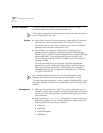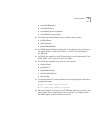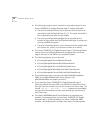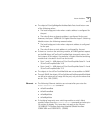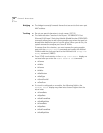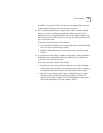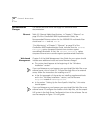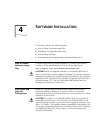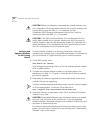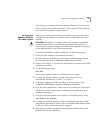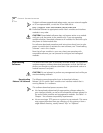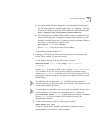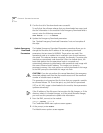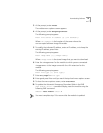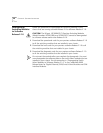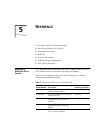
42
C
HAPTER
4: S
OFTWARE
I
NSTALLATION
CAUTION:
Before you attempt to download any module software, save
the configuration file for the release that you are currently running to an
external device using the EME
upload
command. See the
CoreBuilder 9000 Enterprise Management Engine User Guide
for
information about the EME
upload
command.
CAUTION:
If the EME contains a Release 3.0.x configuration file for a
switch fabric module slot or interface module slot, and if you want to
install a module in that slot that already has Release 2.x.x software on it,
delete the Release 3.0.x configuration file from the EME after you save
the 3.0.x configuration file to the external device.
Verifying and
Updating Modules
for an Existing
Chassis
To verify whether modules in an existing, powered-on chassis are
operating with software that is compatible with Release 3.0
software for
your Fast Ethernet or Gigabit Ethernet Layer 2 switching module:
1
At the EME prompt, enter:
show module all verbose
Scroll through the resulting screens to find the software release numbers
of all installed modules.
2
Compare the software release numbers in the display against the
requirements in Table 1
in Chapter 1 to identify which existing modules
you need to upgrade.
3
Have ready the software upgrades and associated release notes for all
modules that you are upgrading.
To obtain software upgrades and release notes, see your network supplier
or 3Com representative, or visit the 3Com Web site at:
http://support.3com.com/infodeli/swlib/index.htm
4
Download software to appropriate switch fabric modules and interface
modules in any order.
CAUTION:
Downloaded software does not become active on a module
until you cycle the power to the module slot.
If you are upgrading
multiple modules, download software to all modules first and then cycle
the power to these module slots.
For software download procedures and instructions about how to cycle
power to module slots to activate the new software, see “Downloading
Software” later in this chapter.



